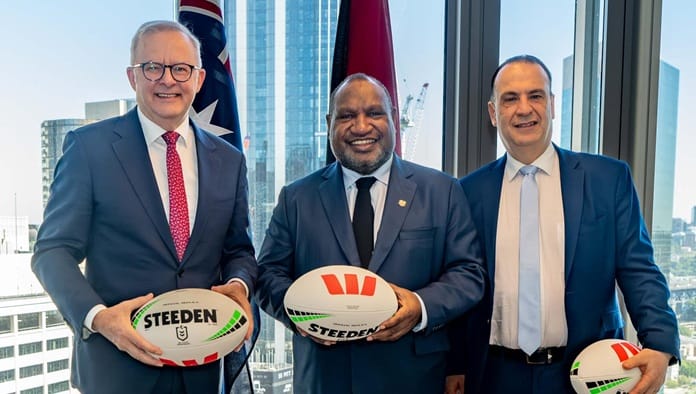The Albanese government is spending almost a billion dollars to bolster Australia’s dominant position in the region and lock out Chinese influence.
In the run-up to the end of the year, deals were signed with PNG ($600 million), Nauru ($140 million) and the Solomon Islands ($190 million), adding to an agreement with Tuvalu signed in November 2023.
Each agreement has different terms—PNG’s is linked to funding for a team to compete in the NRL—but there is a common theme, China.
In exchange for Australian funds, PNG and Nauru have agreed not to engage in security agreements with countries that Canberra frowns upon. It’s a measure squarely aimed at China and one that gives Australia a veto over elements of local sovereignty.
According to the BBC, PNG has signed a pact reaffirming its commitment to Australia as its major security partner.
If PNG enters a security agreement with a country that Australia does not favour, Canberra will withdraw its money and the PNG league team will be forced to drop out of the NRL.
Nauru has committed that the country’s critical infrastructure “shall not be used by any third party for security purposes”.
It has also agreed that Australia can veto any engagements by third countries in Nauru’s “security and key critical infrastructure sectors”.
The situation with the Solomon Islands is not as clear cut. The government in Honiara signed a security agreement with China in 2022 in the dying days of the Morrison Coalition government, sending a wave of panic through the corridors of power in Canberra.
The Solomon Islands still host about 14 Chinese police officers, an arrangement that will continue. But Albanese boasted that, “As a result of this agreement, what we have done is make sure that Australia remains a security partner of choice.”
State of contest
The Australian ruling class has long been concerned about control of the territories and shipping lanes to the north of the continent.
In 1883, Queensland tried to annex eastern New Guinea to pre-empt Germany from seizing it, hoping that Britain would step in and take control, which it did the following year.
The colonial premiers argued, “Further acquisition of dominions in the Pacific south of the equator by any foreign power would be highly detrimental to the safety and well-being of the British possessions in Australasia and injurious to the interests of the Empire.”
Australia put pressure on Britain to seize colonies on other occasions—in Fiji, the New Hebrides (Vanuatu), Samoa and the Cook Islands.
After the Second World War, the Australian ruling class shifted its focus on to the US, with the strategic aim of involving America in the region as a guarantor of Australian regional supremacy.
There was a flurry of concern in the 1980s about Russian influence in the region but with the end of the Cold War, Canberra felt its domination was secure.
The rise of China as a rival to the US has changed that. While the main focus has been on tensions around Taiwan, the South West Pacific is once again an arena of imperialist competition.
As Foreign Minister Penny Wong said in December, “We are in a permanent state of contest in our region, that is the reality.”
In July last year, The Guardian reported that there were more than 60 agreements and initiatives between industrialised countries and Pacific island nations focused on defence and policing.
Australia remains the dominant partner in the region accounting for more than half the deals identified, followed by New Zealand, the US and China.
But China has been expanding its reach, with policing deals with Fiji, the Solomons, Vanuatu and Kiribati.
Excluding China or at least minimising its influence is now core Australian foreign policy business.
Albanese will try to wrap the latest agreement with PNG in a rugby league jersey but this is no game—Australia is part of an inter-imperialist rivalry that is driving a dangerous arms race across the region.
Workers in the region have no interest in this contest. We reject Australia’s imperialist machinations.
By David Glanz






